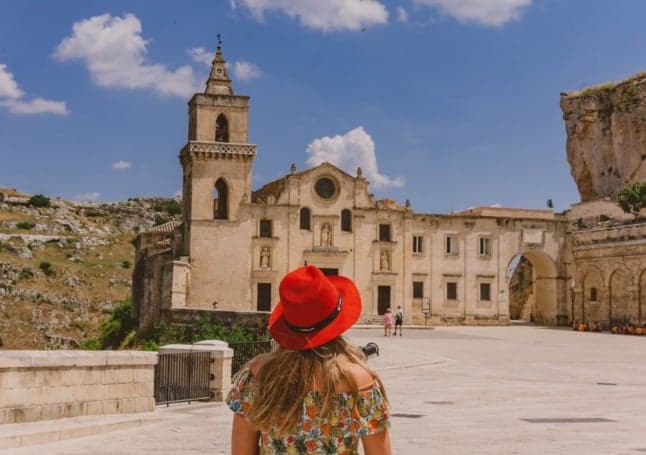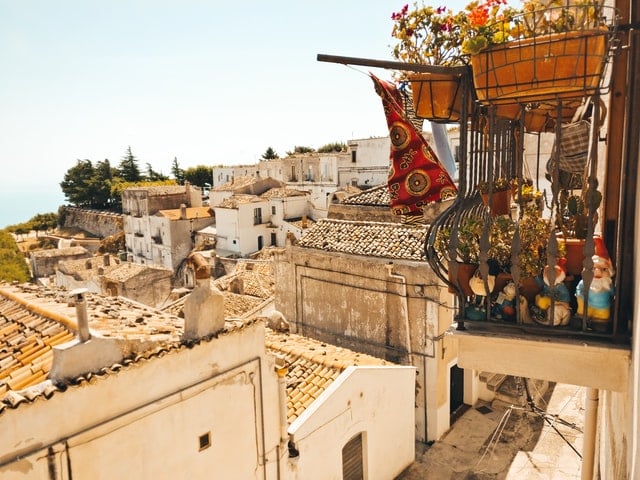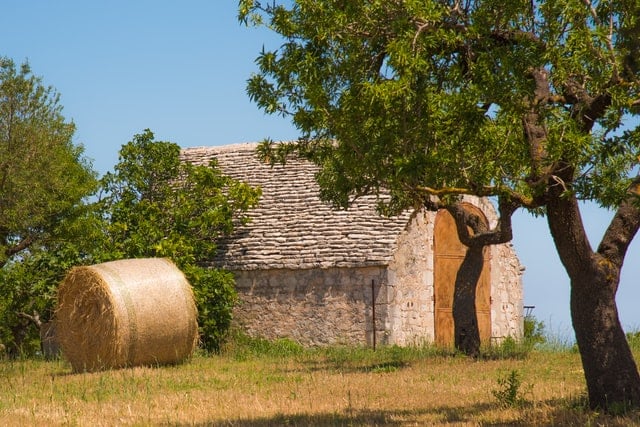OPINION: Bargain homes and fewer crowds - but Italy’s deep south is not for everyone

If you’re considering a move to rural southern Italy there are pros and cons to be aware of, writes Silvia Marchetti.
The Covid-19 pandemic stands as a growth opportunity for Italy’s poorer southern regions, eager to lure foreigners with fewer crowds, super cheap homes, great food, cozy beaches and pristine natural settings.
READ ALSO: These are the Italian towns offering houses for one euro
Social distancing is particularly guaranteed in offbeat rural villages and towns where old traditions survive alongside an idyllic, pre-industrialization vibe and superb scenery.
The south still offers a glimpse of genuine, authentic Italy which particularly appeals to tourists looking for under-the-radar destinations and to people willing to relocate in quiet, picturesque spots.
In the past two years several villages have introduced incentives to attract foreigners longing for year-round sunshine. And it’s not just about offering homes for the cost of an espresso, even if the number of towns selling crumbling buildings for one euro has increased since the pandemic outbreak.
In Sicily the towns of Laurenzana, Troina and Castiglione di Sicilia recently joined the one-euro club, also offering low local taxes for buyers and renovation funds.
Last year Cinquefrondi, in Calabria, promised one.euro homes in a ‘Covid-free’ safe haven with zero contagion cases.

Photo: Alberto Bigoni/Unsplash
This year Taranto, one of Puglia’s main coastal cities, replicated the one-euro houses project following the success of the first operation launched in 2019. There are currently 50 empty buildings on sale in the picturesque old district, waiting for new owners.
And the good news for non-Italian buyers is that you don’t need to take up residency in order to buy a one euro or cheap home.
Other places have come up with different, perhaps more appealing offers in an attempt to invert the negative depopulation trend which plagues the south.
Latronico in Basilicata and Biccari in Puglia have placed on the market cheap redone (turnkey) homes for as little as 10.000 euros, in no need of a restyle and often also refurbished. A few available properties are stone villas that come with orchards and olive groves. Rentals in Latronico are also very low, roughly 200 euros per month.
READ ALSO:
- Italy’s building bonus: Can you really claim back the cost of renovating property?
- Smart working’? Here’s what you need to know about going self-employed in Italy
- Escape from the city: These are the 21 cheapest Italian provinces to move to
Life tends to be cheaper in villages far from the main cities of Palermo (Sicily), Bari (Puglia) and Reggio Calabria (Calabria). The food is locally grown, pasta is still handmade by grannies and you can spot grazing sheep from balconies. Such bucolic locations offer peacefulness and are ideal for detox, unplugged long stays.
But there are also the cons of relocating to Italy’s deep south. The ‘Mezzogiorno’, as Italians call the southern end of their peninsula, has been lagging behind the richer north ever since before the birth of the Italian republic, when Italy was a patchwork of fragmented, bickering states.
The fact that in the past two centuries local families and youth have fled in search of a brighter future in the rest of Italy or abroad - and many still do - speaks for itself. Even though since the end of the second world war the economic outlook has improved, some vulnerabilities persist.

Photo: Gianluca Carenza/Unsplash
The average income in the southern regions is half that in the northern ones, and the development gap embraces all sectors, from infrastructure to health services and labor market opportunities.
Hospitals in the south are generally far away from small towns, and are fewer than in northern areas. There are roughly 2.5 hospital beds per 1,000 people versus 3.5 beds in the north, compared to a European average of 5 beds
READ ALSO: The ups and downs of buying a property for retirement in an Italian hilltop town
And in the south it takes you much more time to get from one place to another due to the smaller network of railway and highways, while many country roads are old and in need of upgrading.
What can be fascinating for an outsider - desolate roads with hairpin curves and unique panoramas - is also penalizing for the region.
Mobile coverage and high-speed internet connections are other major negatives in the south when compared to other parts of the country. In Molise, even though it’s one of Italy’s smallest regions, just 9 percent of the entire population has access to high-speed internet.
READ ALSO:
- Digital divide: The parts of Italy still waiting for fast wifi
- Will Italy really pay you to move to its ‘smart working’ villages?
- Community cooperatives - the small Italian towns taking charge of their own future
The deeper and more off-the-grid you go, the weaker ICT development is. In many remote rural spots you’re lucky if your phone captures a GPRS signal and you are able to place an international call.
But the pandemic is triggering a tiny revolution.
Many southern towns have grasped the potentials of remote working - re-branded ‘south working’ - to lure newcomers and teleworkers. Investments in broadband connection have been boosted while there are new digital labs equipped with everything a remote worker could need.
And there are more plus points. Castelbuono in Sicily for example offers remote workers long-stay accommodation discounts and restaurant vouchers alongside co-working spaces in beautiful old medieval lodgings.
Life in the sunny rural south might be great for retired people, maybe a bit less for younger couples or singles unless they’re looking to open an activity or a B&B. It depends on your expectations and dreams.
I have considered buying a cheap property in Sicily or somewhere close to the sea, to stay just a couple of months per year, mainly in spring and summer, surely not year-round.
But I wouldn’t buy a one euro house - the only reason being I’m just too lazy to deal with the renovation. They are, however, a real bargain.
Comments (1)
See Also
The Covid-19 pandemic stands as a growth opportunity for Italy’s poorer southern regions, eager to lure foreigners with fewer crowds, super cheap homes, great food, cozy beaches and pristine natural settings.
READ ALSO: These are the Italian towns offering houses for one euro
Social distancing is particularly guaranteed in offbeat rural villages and towns where old traditions survive alongside an idyllic, pre-industrialization vibe and superb scenery.
The south still offers a glimpse of genuine, authentic Italy which particularly appeals to tourists looking for under-the-radar destinations and to people willing to relocate in quiet, picturesque spots.
In the past two years several villages have introduced incentives to attract foreigners longing for year-round sunshine. And it’s not just about offering homes for the cost of an espresso, even if the number of towns selling crumbling buildings for one euro has increased since the pandemic outbreak.
In Sicily the towns of Laurenzana, Troina and Castiglione di Sicilia recently joined the one-euro club, also offering low local taxes for buyers and renovation funds.
Last year Cinquefrondi, in Calabria, promised one.euro homes in a ‘Covid-free’ safe haven with zero contagion cases.

Photo: Alberto Bigoni/Unsplash
This year Taranto, one of Puglia’s main coastal cities, replicated the one-euro houses project following the success of the first operation launched in 2019. There are currently 50 empty buildings on sale in the picturesque old district, waiting for new owners.
And the good news for non-Italian buyers is that you don’t need to take up residency in order to buy a one euro or cheap home.
Other places have come up with different, perhaps more appealing offers in an attempt to invert the negative depopulation trend which plagues the south.
Latronico in Basilicata and Biccari in Puglia have placed on the market cheap redone (turnkey) homes for as little as 10.000 euros, in no need of a restyle and often also refurbished. A few available properties are stone villas that come with orchards and olive groves. Rentals in Latronico are also very low, roughly 200 euros per month.
READ ALSO:
- Italy’s building bonus: Can you really claim back the cost of renovating property?
- Smart working’? Here’s what you need to know about going self-employed in Italy
- Escape from the city: These are the 21 cheapest Italian provinces to move to
Life tends to be cheaper in villages far from the main cities of Palermo (Sicily), Bari (Puglia) and Reggio Calabria (Calabria). The food is locally grown, pasta is still handmade by grannies and you can spot grazing sheep from balconies. Such bucolic locations offer peacefulness and are ideal for detox, unplugged long stays.
But there are also the cons of relocating to Italy’s deep south. The ‘Mezzogiorno’, as Italians call the southern end of their peninsula, has been lagging behind the richer north ever since before the birth of the Italian republic, when Italy was a patchwork of fragmented, bickering states.
The fact that in the past two centuries local families and youth have fled in search of a brighter future in the rest of Italy or abroad - and many still do - speaks for itself. Even though since the end of the second world war the economic outlook has improved, some vulnerabilities persist.

Photo: Gianluca Carenza/Unsplash
The average income in the southern regions is half that in the northern ones, and the development gap embraces all sectors, from infrastructure to health services and labor market opportunities.
Hospitals in the south are generally far away from small towns, and are fewer than in northern areas. There are roughly 2.5 hospital beds per 1,000 people versus 3.5 beds in the north, compared to a European average of 5 beds
READ ALSO: The ups and downs of buying a property for retirement in an Italian hilltop town
And in the south it takes you much more time to get from one place to another due to the smaller network of railway and highways, while many country roads are old and in need of upgrading.
What can be fascinating for an outsider - desolate roads with hairpin curves and unique panoramas - is also penalizing for the region.
Mobile coverage and high-speed internet connections are other major negatives in the south when compared to other parts of the country. In Molise, even though it’s one of Italy’s smallest regions, just 9 percent of the entire population has access to high-speed internet.
READ ALSO:
- Digital divide: The parts of Italy still waiting for fast wifi
- Will Italy really pay you to move to its ‘smart working’ villages?
- Community cooperatives - the small Italian towns taking charge of their own future
The deeper and more off-the-grid you go, the weaker ICT development is. In many remote rural spots you’re lucky if your phone captures a GPRS signal and you are able to place an international call.
But the pandemic is triggering a tiny revolution.
Many southern towns have grasped the potentials of remote working - re-branded ‘south working’ - to lure newcomers and teleworkers. Investments in broadband connection have been boosted while there are new digital labs equipped with everything a remote worker could need.
And there are more plus points. Castelbuono in Sicily for example offers remote workers long-stay accommodation discounts and restaurant vouchers alongside co-working spaces in beautiful old medieval lodgings.
Life in the sunny rural south might be great for retired people, maybe a bit less for younger couples or singles unless they’re looking to open an activity or a B&B. It depends on your expectations and dreams.
I have considered buying a cheap property in Sicily or somewhere close to the sea, to stay just a couple of months per year, mainly in spring and summer, surely not year-round.
But I wouldn’t buy a one euro house - the only reason being I’m just too lazy to deal with the renovation. They are, however, a real bargain.
Join the conversation in our comments section below. Share your own views and experience and if you have a question or suggestion for our journalists then email us at [email protected].
Please keep comments civil, constructive and on topic – and make sure to read our terms of use before getting involved.
Please log in here to leave a comment.